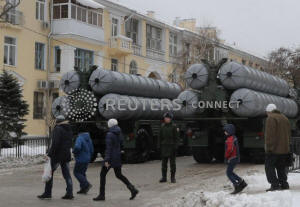|
How U.S. sanctions over a Russian weapon
could rattle Turkey
 Send a link to a friend
Send a link to a friend
 [May 30, 2019]
By Jonathan Spicer [May 30, 2019]
By Jonathan Spicer
ISTANBUL (Reuters) - Turkey is on the cusp
of facing U.S. sanctions over its decision to buy a Russian S-400
missile defense system, leaving its already soft currency and economy
vulnerable and raising questions over its position within NATO and the
region.
If no solution is found in coming weeks and U.S.-Turkish tensions
continue to worsen, tit-for-tat sanctions could hit trade between the
allies and prolong a recession in Turkey that has already tested
President Tayyip Erdogan's grip on power.
Turkey also risks being rapidly cut out of the production and use of
American F-35 fighter jets, which could mark a step toward a
re-evaluation of its 67-year membership in the North Atlantic Treaty
Organization.
"It's very complex to resolve because both U.S. and Turkish officials
see this as a reflection of a larger geo-political balancing," said
Galip Dalay, visiting scholar at the University of Oxford's politics and
international relations department.
"Sanctions would have a very consequential effect on Turkey, but
probably not mark a breaking point in its U.S. relationship," he said.
Ankara and Washington have squabbled for months over the Turkish plan to
buy the S-400s, which the United States says is incompatible with the
Western alliance's defense network and poses a threat to the F-35s that
Turkey also plans to buy.

Turkey says defending its territory poses no threat to allies, and
stresses it has met all NATO obligations.
Both sides are entrenched even while they have repeated a desire to
avoid so-called CAATSA sanctions, which by U.S. law would be triggered
when the Russian anti-aircraft weapon arrives on Turkish soil, possibly
as soon as July.
An agreement to delay shipment of the S-400s could still open the door
to U.S. President Donald Trump convincing Erdogan to turn his back on
what the Turkish leader has repeatedly called a "done deal" with Russia.
The pair agreed on Wednesday to meet on the sidelines of a G-20
conference on June 28-29.
Yet Ankara's ties with Moscow have been strengthening, and Turkey's
defense minister said last week Turkish military personnel were in
Russia for S-400 training. In response, the United States is considering
halting the training of Turkish pilots on F-35 stealth fighters in
Arizona.
The showdown comes as the Russia-backed Syrian army escalates an assault
on some Turkish-backed rebels near Turkey's border. More broadly in the
Middle East, the United States is ramping up pressure on Turkey and
other nations to isolate Iran including blocking all Iranian oil
exports.
"If the U.S. sanctions are bad, Turkey could reconsider its decision to
comply with U.S. sanctions on Iran," said Dalay.
'PATH TO ESCALATION'
Washington wants Ankara to buy its alternative Patriot surface-to-air
missile batteries and has made an offer that expires on June 4,
according to a person familiar with the matter.
[to top of second column]
|

People walk past Russian S-400 missile air defence systems before
the military parade to commemorate the 75th anniversary of the
battle of Stalingrad in World War Two, in the city of Volgograd,
Russia February 2, 2018. REUTERS/Tatyana Maleyeva/File Photo

If Ankara accepts delivery of the S-400s as planned, the U.S.
Congress has moved to block delivery of F-35s to Turkey and remove
it from the list of nations working together to build them.
The delivery would also force Trump to select five of 12 possible
sanctions under the Countering America's Adversaries Through
Sanctions Act, or CAATSA, which targets purchases of military
equipment from NATO foe Russia.
The sanctions range from banning visas and denying access to the
U.S.-based Export-Import Bank, to the harsher options of blocking
any transactions with the U.S. financial system and denying export
licenses.
Trump may initially choose milder options targeting individual Turks
rather than the government, a decision that could buy time for more
diplomacy even while it may prompt Congress to separately impose
tougher sanctions.
"There is a U.S. reticence to completely block the
military-industrial relationship with Turkey," said Sinan Ulgen, a
former Turkish diplomat and a visiting scholar at Carnegie Europe in
Brussels.
Yet U.S. sanctions of any sort would likely hammer the Turkish lira,
which has shed 14% of its value against the dollar this year in part
due to fraying U.S. ties.
Last year, a separate set of U.S. sanctions and tariffs over a
jailed U.S. pastor helped set off a currency crisis that knocked 30%
off the lira, tipped Turkey into recession and rattled emerging
markets around the world.
Ratings agency Moody's said this month that Turkey's political risk
is "high" and warned that the S-400s could trigger not only U.S. but
also NATO sanctions.
Turkey has a track record of responding in kind to foreign sanctions
and tariffs.
Ulgen said any sanctions dispute could escalate into tariffs that
harm U.S.-based Lockheed Martin Corp's business with Turkish
industrial companies, and even threaten future upgrades to Turkey's
existing fleet of F-16 jets.

"Heavier sanctions could follow if the United States finds itself on
a path to escalation with Turkey, beyond the usual rhetoric," he
said.
(Reporting by Jonathan Spicer; Additional reporting by Humeyra Pamuk
in Washington, Editing by William Maclean)
[© 2019 Thomson Reuters. All rights
reserved.]
Copyright 2019 Reuters. All rights reserved. This material may not be published,
broadcast, rewritten or redistributed.
Thompson Reuters is solely responsible for this content. |